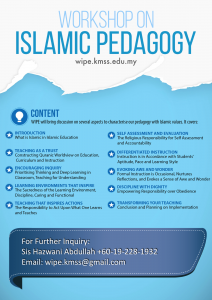COMPONENT #1: INTRODUCTION (WHAT IS ISLAMIC IN ISLAMIC EDUCATION)
What is ‘Islamic’ in Islamic education? What makes something Islamic and not Islamic? We might be focusing our attention to the ‘what’ in education to define it as Islamic. It depends on what you teach. If in a school, subjects like Quran and Fiqh are taught, would that make the education an Islamic education? Why is that so? Here in this segment, we will discuss critically on the characters that shape the education to truly reflect Islam in concept, curricular and instructions.
COMPONENT #2: TEACHING AS A TRUST
Three teachers go to the same school, have the same workload, receive the same amount of salary. One is always stressful at work, the other has a better focus and the third one enjoys teaching and gives his or her best to make the teaching, and learning successful. What leads to these differences? We are what we believe, therefore we embark on constructing Quranic worldview in education, curricular and instructions, positioning them within the framework of teaching as a noble trust from Allah. It has a direct association with our WHY in becoming teachers and educators.
COMPONENT #3: NURTURING THE CULTURE OF THINKING
School exists to serve students. The core activity is learning. Poor level of understanding is a direct consequence from a poorly designed curriculum. All energy and resources must be directed in schools into prioritising thinking and deep learning in classroom. We teach for understanding. We need a strategy to encourage inquiry among students, to ‘produce’ lifelong learners.
COMPONENT #4: THE INSPIRING ENVIRONMENT AND SURROUNDING
We are khalifah of Allah. One of our responsibilities is to keep the physical world good, clean and beautiful, pleasing to Allah. It should begin from the classroom. The Sacredness of the learning Environment requires strategy, discipline, guidance with love and care, and functional. Teachers play significant role in highlighting learning values in the surrounding and make everything relevant to thinking and learning.
COMPONENT #5: TEACHING THAT INSPIRES ACTIONS
Knowledge and action are twins. Knowledge on its own is not useful until one acts upon the learned knowledge. Specific strategy is required to nurture motivation on acting upon knowledge. The responsibility to act upon what one learns and teaches leads teachers to promote action, benefiting from variety forms of learning.

COMPONENT #6: SELF ASSESSMENT AND EVALUATION
An organic learning consistently assesses students’ progress from time to time. The idea of assessment is not to rank students but to identify their points of strength and weakness for improvement. Evalution in Islamic education has to be shifted to its original spirit of the religious responsibility, described in a concept of muhāsabah, which promotes self assessment and accountability.
COMPONENT #7: DIFFERENTIATED INSTRUCTIONS
Instruction in Islamic education, following the Prophetic examples works in accord with the students’ aptitude, pace and learning style. Sīrah indicates how Prophet Muhammad PBUH customised the way he delivered the learning according to the specific condition of the learners among his companions. Currently, instead of educating the child as a whole in an individualised manner that nourishes the love for learning, the trend is to produce students who can memorise facts that are soon forgotten. A one-size-fits-all approach is a serious mistake, and therefore a new and fresher paradigm is needed.
COMPONENT #8: EVOKING AWE AND WONDER
Teachers no longer represent the single source of information and knowledge for students as it used to be. Boredom and lack of enthusiasm demotivate students from effective learning. Meanwhile, formal instruction is supposed to be occasional, nurture reflections, and evoke a sense of awe and wonder. How did the Prophet PBUH do this and how did his companions developed the ‘schooling’ design? Would there be a different way to promote ‘feel-good education’?
COMPONENT #9: DISCIPLINE WITH DIGNITY
True discipline can only be accomplished if the basic needs of the students are met first and done so within the paradigm of dignified conduct. ‘Rehumanising’ education is critically needed, where students are shaped to nurture sense of responsibility over obedience. Rather than focusing on the (mis)behaviour, discipline with dignity tries to identify the lack of needs that leads to the misbehaviour, and addresses the real problems over the presenting ones.
